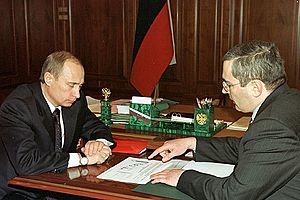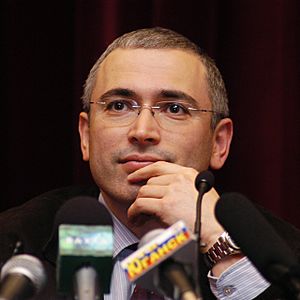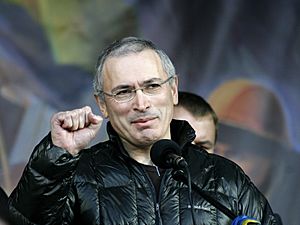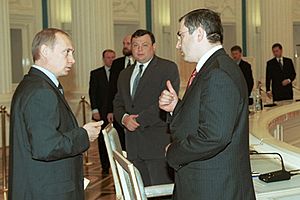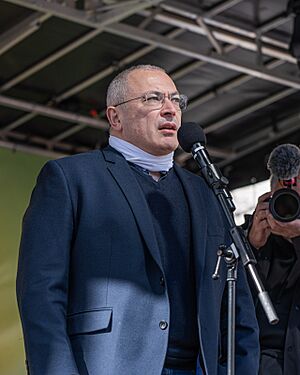Mikhail Khodorkovsky facts for kids
Quick facts for kids
Mikhail Khodorkovsky
|
|
|---|---|
| Михаил Ходорковский | |
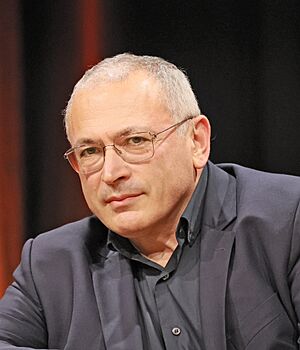
Khodorkovsky in 2023
|
|
| Born | 26 June 1963 Moscow, Russian SFSR, Soviet Union
|
| Nationality | Russian |
| Alma mater | Mendeleev Russian University of Chemistry and Technology |
| Occupation |
|
| Spouse(s) |
|
| Children | Pavel, Anastasia, Ilya, Gleb |
Mikhail Borisovich Khodorkovsky (Russian: Михаил Борисович Ходорковский; born 26 June 1963) is a Russian businessman and activist. He is sometimes known by his initials, MBK. He used to be one of the richest people in Russia. Today, he lives in London.
In 2003, people thought Khodorkovsky was the wealthiest person in Russia. His money was estimated to be around $15 billion. He was also ranked 16th on the Forbes list of billionaires.
Contents
Early Life and Education
Mikhail Khodorkovsky was born in Moscow, Russia, on June 26, 1963. His parents, Boris and Marina, were engineers. They worked at a factory in Moscow that made measuring tools. His father was Jewish, and his mother was Russian Orthodox Christian.
His family lived comfortably. Young Mikhail was very driven and got excellent grades in school. He became a leader in the Komsomol, which was a youth group in the Soviet Union. He studied at the D. Mendeleev University of Chemical Technology of Russia. In 1986, he graduated with a degree in chemical engineering.
Starting a Business Career
After finishing university in 1986, Khodorkovsky worked for the Komsomol full-time. During the late 1980s, the Soviet Union started to change. This period was called glasnost (openness) and perestroika (restructuring). During this time, Khodorkovsky began several businesses.
In 1987, he and his friends opened a center for science and technology. This center imported and sold computers. It also traded many other products. This business helped them start Bank Menatep in 1989. Menatep was one of Russia's first private banks. It grew very quickly. The government even let Bank Menatep manage money for people affected by the Chernobyl nuclear accident.
After the dissolution of the Soviet Union in the 1990s, Russia changed its economy. Many state-owned companies were sold to private owners. This was called "privatization." Khodorkovsky gained a lot of money by taking control of oil fields in Siberia. These fields became part of a big company called Yukos. Yukos was one of the largest companies to come from this privatization. Khodorkovsky also advised the first government of Boris Yeltsin on economic matters.
Legal Challenges and Life Abroad
In October 2003, Russian authorities took action against Khodorkovsky. The government, led by Vladimir Putin, then froze shares of his company, Yukos, related to tax issues. The government took more steps against Yukos. This caused the company's stock price to fall sharply. Much of Khodorkovsky's wealth disappeared.
In May 2005, Khodorkovsky was sent to prison. In December 2010, while still in prison, he faced more legal issues. His prison sentence was extended until 2014. Many people around the world believed his legal troubles might be connected to politics. Some felt the trials were not fair.
Khodorkovsky made several requests to the European Court of Human Rights. This court deals with human rights issues. He said that Russia had not respected his rights. The court found that Russian authorities had violated some of his rights. However, the court also said that the charges against him were based on "reasonable suspicion." Amnesty International, a human rights group, considered him a "prisoner of conscience."
In December 2013, President Putin pardoned Khodorkovsky. He was released from prison. He immediately left Russia and moved to Switzerland. At that time, his personal wealth was estimated to be around $100–250 million. By the end of 2014, it was about $500 million. In 2015, he moved to London. In December 2016, a court in Dublin, Ireland, unfroze $100 million of his money.
Involvement in Politics
In 2001, Khodorkovsky started an organization called Open Russia. This group aimed to "build and strengthen civil society" in Russia. It wanted to help people have more say in their country.
On September 20, 2014, Khodorkovsky officially restarted the Open Russia movement. He held a live video meeting with groups of activists across Russia. These groups supported democracy.
In October 2014, Khodorkovsky visited the United States. He gave speeches in Washington, D.C., and New York. An article in the Wall Street Journal in October 2014 said that Khodorkovsky wanted to change Russia's government. He hoped to shift power from the president to the parliament and courts.
In September 2016, Khodorkovsky launched a website called "Instead of Putin." On this site, people could vote for other leaders besides President Putin. In May 2022, the Russian government officially called Khodorkovsky a 'foreign agent.'
Personal Life
While in college, Khodorkovsky married Yelena, a fellow student. They have a son named Pavel. Even though they later divorced, they remained friends. Yelena actively helped in the effort to get him released from prison.
Khodorkovsky also has a daughter and two sons with Inna. Inna was a student at the Mendeleev Institute and worked with him at the Komsomol organization.
Helping Others (Philanthropy)
Since the early 2000s, Khodorkovsky has been involved in many efforts to help people. These include:
- Open Russia Foundation
- Khodorkovsky Foundation
- The Oxford Russia Fund, which is part of his foundation
- The Future of Russia Foundation (also known as the Future of Russia Trust), based in London
- The organization European Choice
See also
 In Spanish: Mijaíl Jodorkovski para niños
In Spanish: Mijaíl Jodorkovski para niños
 | Delilah Pierce |
 | Gordon Parks |
 | Augusta Savage |
 | Charles Ethan Porter |


